Lisa Larkin, lets out a hearty laugh when I casually mention I might attend our planned photoshoot (“since Durrow is so close to my home place in north Tipperary”).
“I’m in a different Durrow,” she manages in between chuckles. She has clearly encountered this problem before.
“We’re just outside Tullamore; it’s very confusing,” she explains. “We drive the couriers bonkers! I had a stand at the Ploughing (a few years ago) and nearly needed a sign saying ‘No, we’re not in Laois! We’re not in Waterford!’”
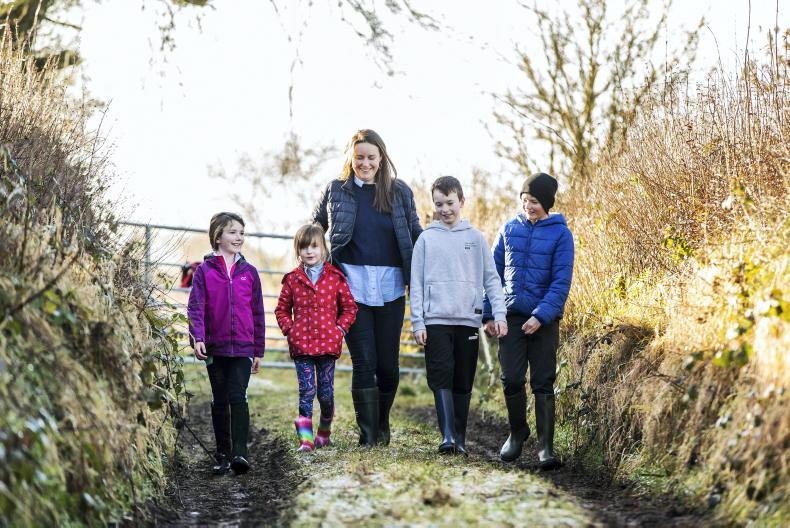
Lisa Larkin with her kids, from left; Charlie, Pippa, JP and Guy. \ Philip Doyle
Initial confusion sorted; we turn to Lisa’s food business, Durrow Mills, which manufactures a unique line of sprouted flours. The process requires buying in grain (including rye, buckwheat, spelt and wheat) and germinating it – just to a certain point – before milling.
Product precision
The process is precise: too much germination and the flour, once milled, won’t work for baking. 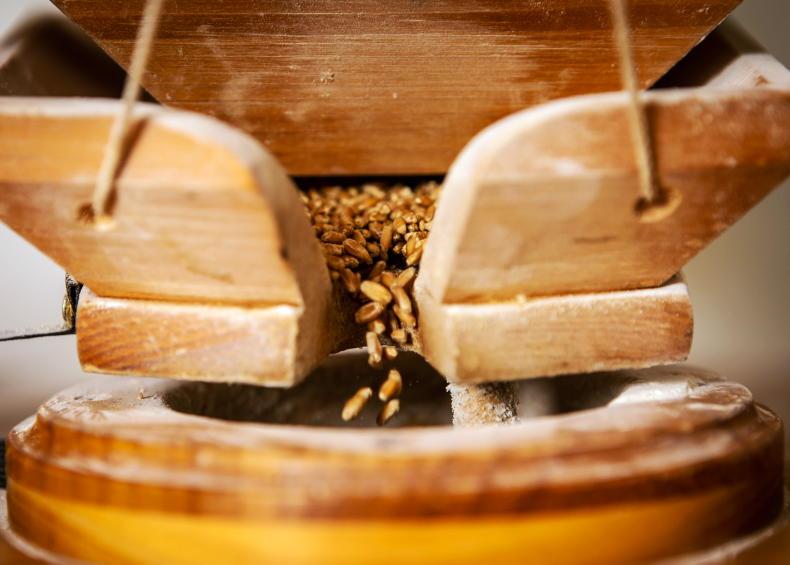
Too little, and the nutritional and digestive benefits won’t take effect. She “sprouted” the concept – the first business of its kind in Ireland – in 2015 after reading about sprouted flours on a food blog. They also have an on-site micro-bakery where they bake and deliver sprouted breads to the surrounding region.
Creating opportunity
“For 16 years, I worked in Dublin as an embryologist in an IVF clinic,” she says. “It was a long commute every day. I was looking for opportunities locally and the most logical thing ended up being to start my own business. Coming across the sprouted grains; I thought, ‘Nobody’s doing that’. In our family, we had a lot of problems with gut issues and it was of something I had an interest in – it all tied together.”
An idea is one thing, but to develop germinated grains to a consistent standard (and at manufacturing volumes) is another. The journey to shelf-ready bags of flour took nearly 18 months and a few failed attempts. Lisa says she accepted plenty of help during this time and was particularly lucky to have a husband with a unique skillset.
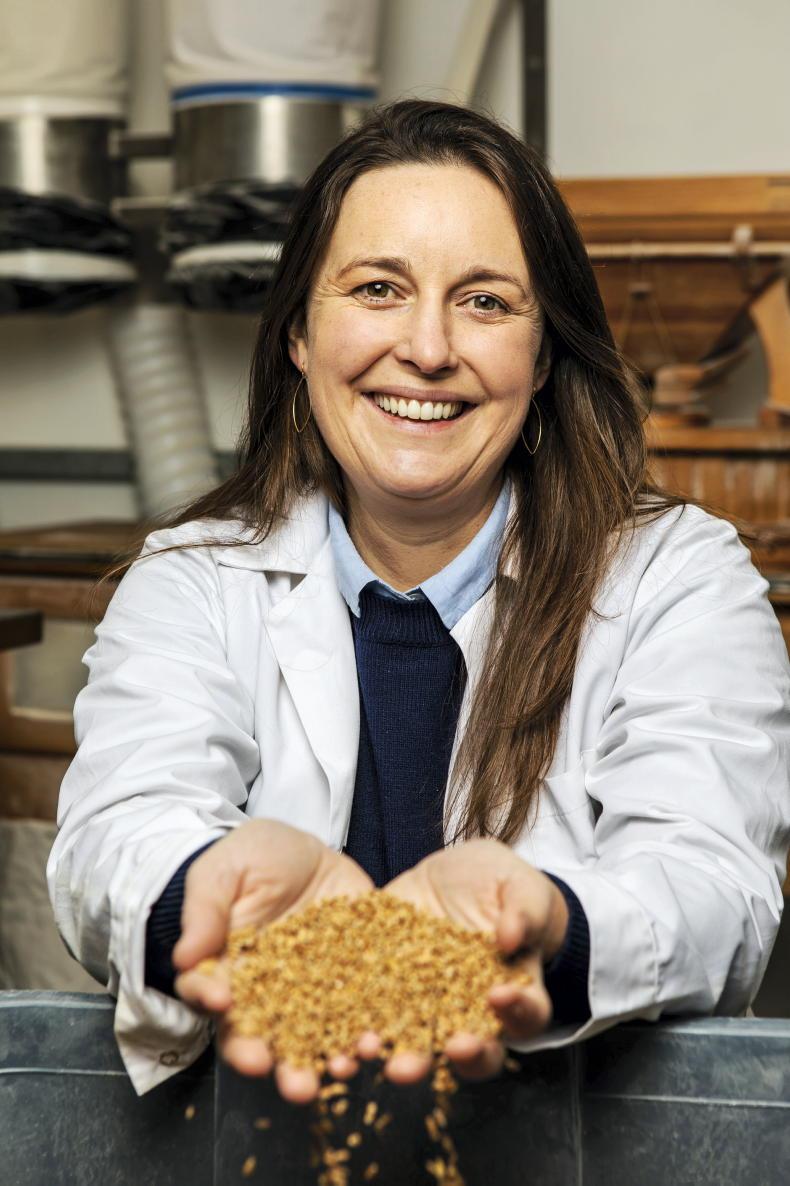
“It was very challenging to get the product right because we’re germinating the grains – it won’t work if the process isn’t done perfectly,” she explains. “We needed to build the equipment to be able to make it in large enough volumes to sell commercially. My husband happens to be an engineer (as well as a farmer), so he was able to design and build all the equipment needed, but it still took a long time to get everything running smoothly.”
Accepting help
Lisa also availed of grant schemes from the Local Enterprise Office and Enterprise Ireland, which enabled crucial market research as well as helping with other start-up costs.
“Before we invested [too much,] I wanted to see if there was demand for the product,” she continues. “We got quite a favourable response [from our market research], I was surprised because I wasn’t sure if it was, maybe, a bit too different for people. Once we were sure, we went about converting our building and building the equipment.”
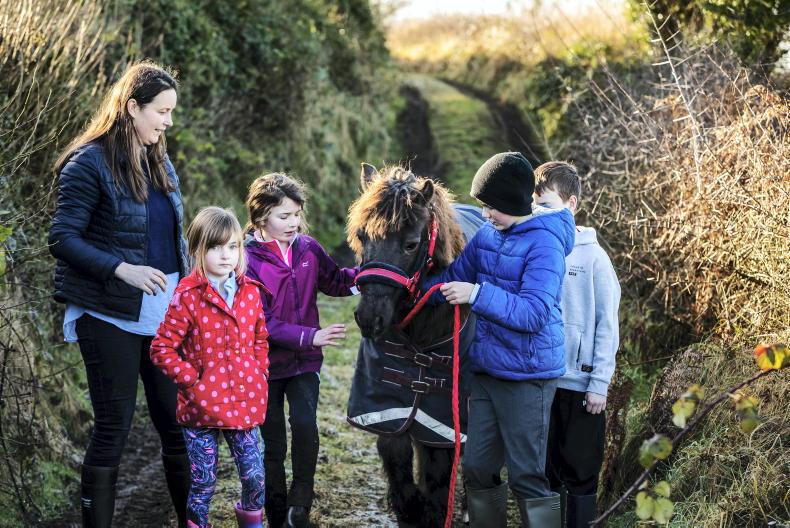
Durrow Mills is located just outside Tullamore. \ Philip Doyle
A unique product
Initially, the Enterprise Ireland grant helped secure Lisa’s first round of customers, but she says their growth has continued organically since then. She now exports her sprouted flours to clients in the UK and Spain, as well as offering delivery throughout Ireland.
“It’s a very different type of flour,” she says. “When the grain germinates, it becomes more like a plant – its nutritional properties change. Phytates are a natural substance in grains which prevent them from germinating [until the right conditions are met], but in this state they’re more difficult to digest. When the grain germinates, the phytates are broken down and it becomes easier to digest; it also opens up more nutritional qualities.”
Pandemic-induced shift
Since the COVID-19 pandemic, Lisa’s online sales have surged and she feels, with more people baking from scratch, there is also more of an interest in the nutritional benefits of her product line. She is currently in the early stages of developing some new retail products and the business itself is starting to outgrow their production facility.

A growing trend in high-end pastry is using unique flours for otherwise traditional bakes. \ Philip Doyle
“Our business has two sections: the bakery and the flour, so initially, COVID affected us negatively in terms of food service shutting down,” she explains. “We lost a lot of clients straight away. But then, our online shop went crazy. That kind of took us by surprise – we woke up one morning and, while online was never our focus, we suddenly had hundreds of orders! I thought it was a computer glitch.
“Lockdown continues to be a challenge in other ways,” she continues. “I have four young children and am trying to manage home life and work. Our kids are 12, 11, eight and six, so we’re very busy.”
Grain matters
Because she finds conventional grain doesn’t germinate as well, Lisa sources only organic grains. She uses Irish-grown grains where possible and is continually looking at products developed from other Irish grain varieties. Their farm is currently in grass, but they are completing their own organic conversion and hope to grow some of their own varieties.

Lisa recently won a Blas na hÉireann award for both her sprouted buckwheat flour and fine-milled wheat flour. \ Philip Doyle
In the meantime, she will navigate whichever issues arise from Brexit – though she says, at the minute, things have been running smoothly with both imports and exports to the UK, though they will likely have to absorb some extra costs with tariffs and customs. “Our flour has proven to be very popular in the UK with sales steadily growing even since January after Brexit,” she says.
“With our product, you need to maintain consistency and look at what grain is currently available in Ireland,” she adds. “There are some great Irish grains being grown right now and thankfully this is an area people are starting to look at. I think there are definite opportunities which have arisen from Brexit; for example, the majority of flour is coming from Britain and there’s positive movement happening toward increasing Irish flour production. There’s no reason we can’t be more self-sufficient as a country.”
Culinary use
A growing trend in high-end pastry is using unique flours for otherwise traditional bakes. 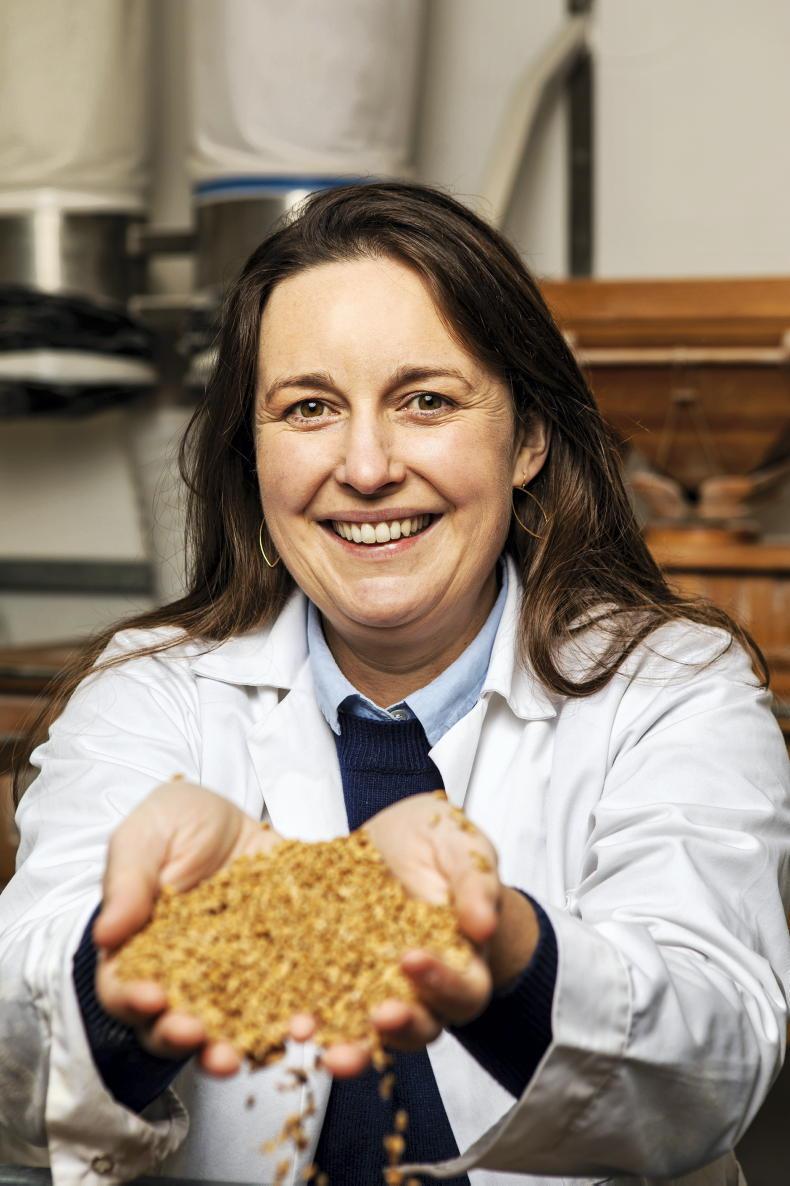
For example, heritage wheats, non-traditional flavours like rye and buckwheat and wholemeal flours are being used in croissants, cakes and tart doughs. Different flours can add texture, flavour and character to baked goods which has led to this increasing popularity.
Lisa uses her products for the simple, everyday bakes she and her family enjoy. She recently won a Blas na hÉireann award for both her sprouted buckwheat flour and fine-milled wheat flour.
“I actually used to bake a lot more before I started the business,” she laughs. “My main staples would be pancakes, which are fast to whip up (with normal wheat or buckwheat flour). I make a lot of crumbles, pizzas and brownies are a quick one to whip up, as well. We have a rye flour brownie recipe on the packet and they taste great. The kids love making buns and we’re spoiled with bread from the bakery!
“For those into sourdough, our flour ferments really well,” she continues. “It’s extremely active – some people find it too active! People sometimes send me pictures of their sourdough starter bubbling out of the jar. Our flours keep their enzymatic activity, which helps the starter’s fermentation process.”
Support to keep going
Before going into business, she expected things would feel competitive, especially in relation to other local food producers. 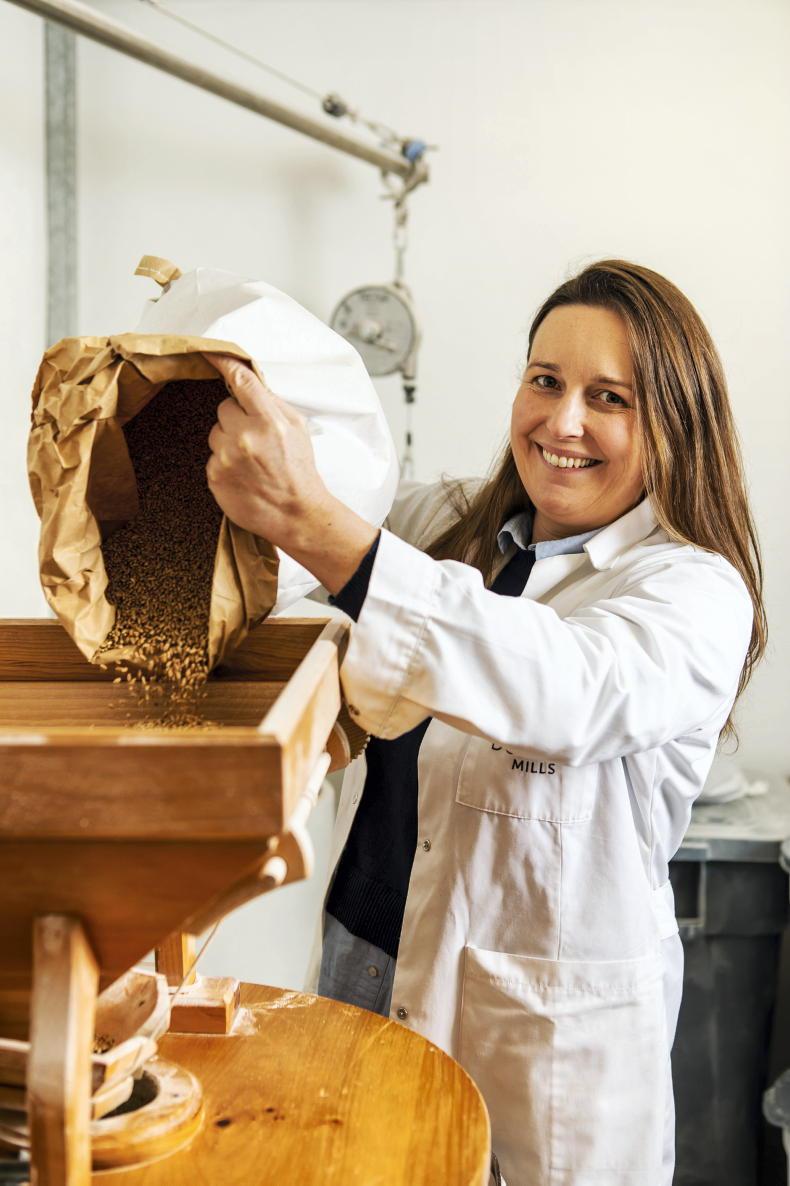
In actuality, the support and friendship she has experienced from within the food community has been the most wonderful aspect of her business journey. She feels a lot of support from the ACORNS group, in particular, which she joined in the early stages of her business plan.
“I’ve relied on the ACORNS group a lot; they’ve been fantastic and I have a good network of people and businesses and we support each other,” she says. “I think the things I’ve enjoyed the most about the business are all the people I’ve met and how supportive everyone has been.”
“With the many production hurdles; we nearly gave up on the idea. We just found it so tricky to get the product right, at first. I then joined Acorns and their support helped me get though, as I may have given up otherwise. With no business background; things like accounting and finance were daunting. Overall, these problems have made me stronger. We’ve come through and we’re still here.”
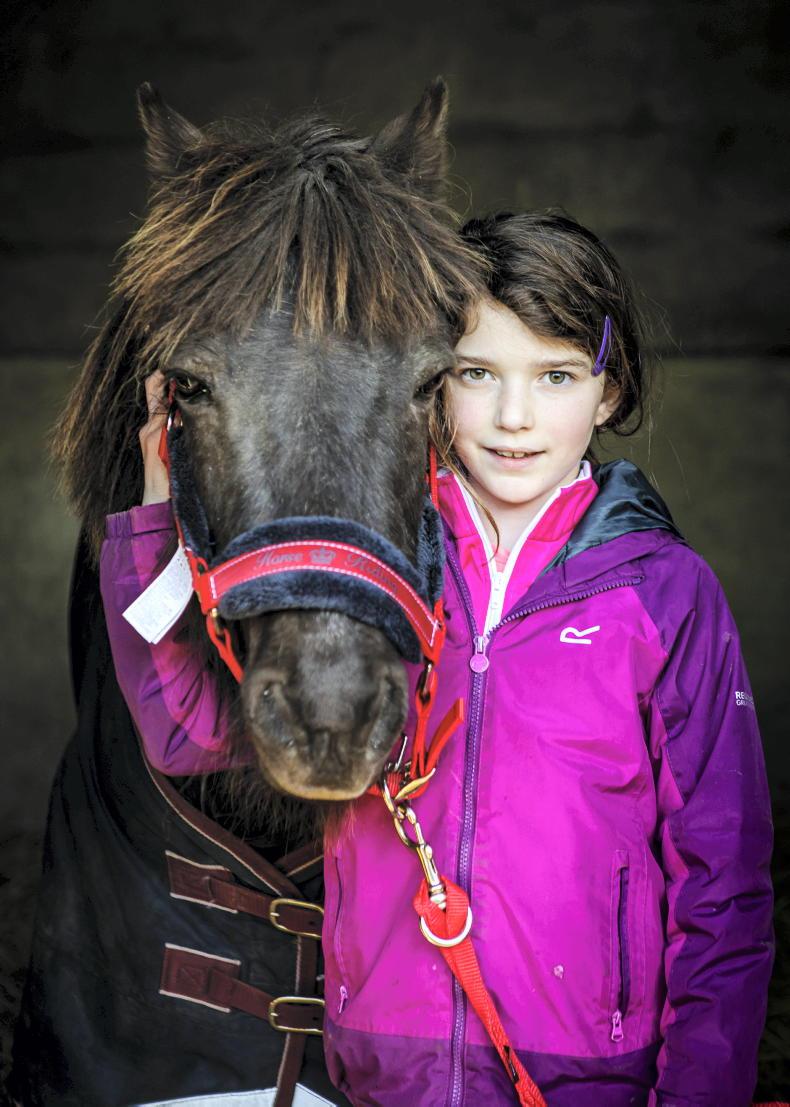
Lisa, husband Tom and their four children – sons JP (12) and Guy (11) and daughters Charlie (nine) and Pippa (six) – love to make the most of country living on their farm, which consists of a suckler herd, drystock and houses their two ponies, Misty and Biscuit. The sucklers are a combination of mixed breed and purebred Limousin. Tom and Lisa are in the process of converting their farm to organic and hope to start with some tillage in the next year. Lisa would like to start growing some of their own grain.
Read more
The ins and outs of sourdough bread
Arán Kilkenny: using Irish heritage wheat to produce speciality bread
Dempsey at Large: A future for Irish flour milling again?
Lisa Larkin, lets out a hearty laugh when I casually mention I might attend our planned photoshoot (“since Durrow is so close to my home place in north Tipperary”).
“I’m in a different Durrow,” she manages in between chuckles. She has clearly encountered this problem before.
“We’re just outside Tullamore; it’s very confusing,” she explains. “We drive the couriers bonkers! I had a stand at the Ploughing (a few years ago) and nearly needed a sign saying ‘No, we’re not in Laois! We’re not in Waterford!’”

Lisa Larkin with her kids, from left; Charlie, Pippa, JP and Guy. \ Philip Doyle
Initial confusion sorted; we turn to Lisa’s food business, Durrow Mills, which manufactures a unique line of sprouted flours. The process requires buying in grain (including rye, buckwheat, spelt and wheat) and germinating it – just to a certain point – before milling.
Product precision
The process is precise: too much germination and the flour, once milled, won’t work for baking. 
Too little, and the nutritional and digestive benefits won’t take effect. She “sprouted” the concept – the first business of its kind in Ireland – in 2015 after reading about sprouted flours on a food blog. They also have an on-site micro-bakery where they bake and deliver sprouted breads to the surrounding region.
Creating opportunity
“For 16 years, I worked in Dublin as an embryologist in an IVF clinic,” she says. “It was a long commute every day. I was looking for opportunities locally and the most logical thing ended up being to start my own business. Coming across the sprouted grains; I thought, ‘Nobody’s doing that’. In our family, we had a lot of problems with gut issues and it was of something I had an interest in – it all tied together.”
An idea is one thing, but to develop germinated grains to a consistent standard (and at manufacturing volumes) is another. The journey to shelf-ready bags of flour took nearly 18 months and a few failed attempts. Lisa says she accepted plenty of help during this time and was particularly lucky to have a husband with a unique skillset.

“It was very challenging to get the product right because we’re germinating the grains – it won’t work if the process isn’t done perfectly,” she explains. “We needed to build the equipment to be able to make it in large enough volumes to sell commercially. My husband happens to be an engineer (as well as a farmer), so he was able to design and build all the equipment needed, but it still took a long time to get everything running smoothly.”
Accepting help
Lisa also availed of grant schemes from the Local Enterprise Office and Enterprise Ireland, which enabled crucial market research as well as helping with other start-up costs.
“Before we invested [too much,] I wanted to see if there was demand for the product,” she continues. “We got quite a favourable response [from our market research], I was surprised because I wasn’t sure if it was, maybe, a bit too different for people. Once we were sure, we went about converting our building and building the equipment.”

Durrow Mills is located just outside Tullamore. \ Philip Doyle
A unique product
Initially, the Enterprise Ireland grant helped secure Lisa’s first round of customers, but she says their growth has continued organically since then. She now exports her sprouted flours to clients in the UK and Spain, as well as offering delivery throughout Ireland.
“It’s a very different type of flour,” she says. “When the grain germinates, it becomes more like a plant – its nutritional properties change. Phytates are a natural substance in grains which prevent them from germinating [until the right conditions are met], but in this state they’re more difficult to digest. When the grain germinates, the phytates are broken down and it becomes easier to digest; it also opens up more nutritional qualities.”
Pandemic-induced shift
Since the COVID-19 pandemic, Lisa’s online sales have surged and she feels, with more people baking from scratch, there is also more of an interest in the nutritional benefits of her product line. She is currently in the early stages of developing some new retail products and the business itself is starting to outgrow their production facility.

A growing trend in high-end pastry is using unique flours for otherwise traditional bakes. \ Philip Doyle
“Our business has two sections: the bakery and the flour, so initially, COVID affected us negatively in terms of food service shutting down,” she explains. “We lost a lot of clients straight away. But then, our online shop went crazy. That kind of took us by surprise – we woke up one morning and, while online was never our focus, we suddenly had hundreds of orders! I thought it was a computer glitch.
“Lockdown continues to be a challenge in other ways,” she continues. “I have four young children and am trying to manage home life and work. Our kids are 12, 11, eight and six, so we’re very busy.”
Grain matters
Because she finds conventional grain doesn’t germinate as well, Lisa sources only organic grains. She uses Irish-grown grains where possible and is continually looking at products developed from other Irish grain varieties. Their farm is currently in grass, but they are completing their own organic conversion and hope to grow some of their own varieties.

Lisa recently won a Blas na hÉireann award for both her sprouted buckwheat flour and fine-milled wheat flour. \ Philip Doyle
In the meantime, she will navigate whichever issues arise from Brexit – though she says, at the minute, things have been running smoothly with both imports and exports to the UK, though they will likely have to absorb some extra costs with tariffs and customs. “Our flour has proven to be very popular in the UK with sales steadily growing even since January after Brexit,” she says.
“With our product, you need to maintain consistency and look at what grain is currently available in Ireland,” she adds. “There are some great Irish grains being grown right now and thankfully this is an area people are starting to look at. I think there are definite opportunities which have arisen from Brexit; for example, the majority of flour is coming from Britain and there’s positive movement happening toward increasing Irish flour production. There’s no reason we can’t be more self-sufficient as a country.”
Culinary use
A growing trend in high-end pastry is using unique flours for otherwise traditional bakes. 
For example, heritage wheats, non-traditional flavours like rye and buckwheat and wholemeal flours are being used in croissants, cakes and tart doughs. Different flours can add texture, flavour and character to baked goods which has led to this increasing popularity.
Lisa uses her products for the simple, everyday bakes she and her family enjoy. She recently won a Blas na hÉireann award for both her sprouted buckwheat flour and fine-milled wheat flour.
“I actually used to bake a lot more before I started the business,” she laughs. “My main staples would be pancakes, which are fast to whip up (with normal wheat or buckwheat flour). I make a lot of crumbles, pizzas and brownies are a quick one to whip up, as well. We have a rye flour brownie recipe on the packet and they taste great. The kids love making buns and we’re spoiled with bread from the bakery!
“For those into sourdough, our flour ferments really well,” she continues. “It’s extremely active – some people find it too active! People sometimes send me pictures of their sourdough starter bubbling out of the jar. Our flours keep their enzymatic activity, which helps the starter’s fermentation process.”
Support to keep going
Before going into business, she expected things would feel competitive, especially in relation to other local food producers. 
In actuality, the support and friendship she has experienced from within the food community has been the most wonderful aspect of her business journey. She feels a lot of support from the ACORNS group, in particular, which she joined in the early stages of her business plan.
“I’ve relied on the ACORNS group a lot; they’ve been fantastic and I have a good network of people and businesses and we support each other,” she says. “I think the things I’ve enjoyed the most about the business are all the people I’ve met and how supportive everyone has been.”
“With the many production hurdles; we nearly gave up on the idea. We just found it so tricky to get the product right, at first. I then joined Acorns and their support helped me get though, as I may have given up otherwise. With no business background; things like accounting and finance were daunting. Overall, these problems have made me stronger. We’ve come through and we’re still here.”

Lisa, husband Tom and their four children – sons JP (12) and Guy (11) and daughters Charlie (nine) and Pippa (six) – love to make the most of country living on their farm, which consists of a suckler herd, drystock and houses their two ponies, Misty and Biscuit. The sucklers are a combination of mixed breed and purebred Limousin. Tom and Lisa are in the process of converting their farm to organic and hope to start with some tillage in the next year. Lisa would like to start growing some of their own grain.
Read more
The ins and outs of sourdough bread
Arán Kilkenny: using Irish heritage wheat to produce speciality bread
Dempsey at Large: A future for Irish flour milling again?














SHARING OPTIONS